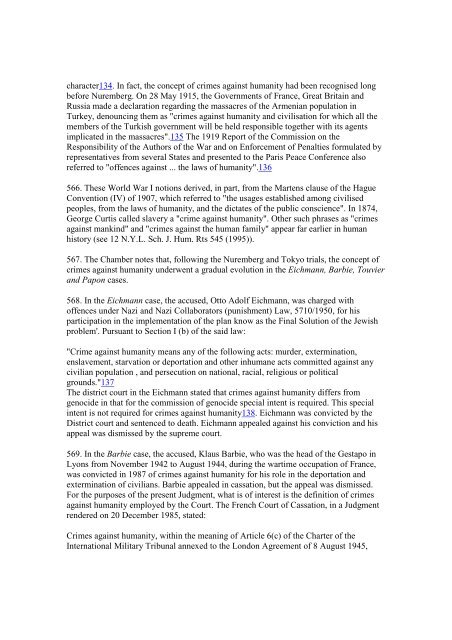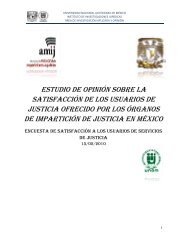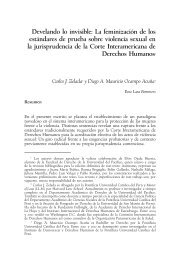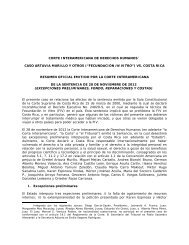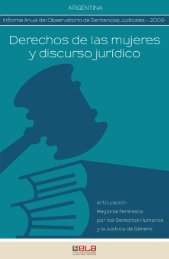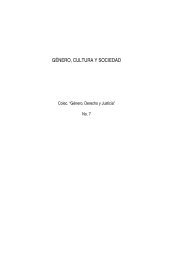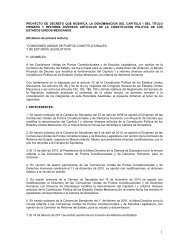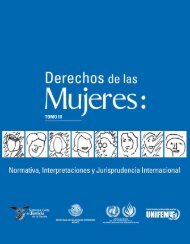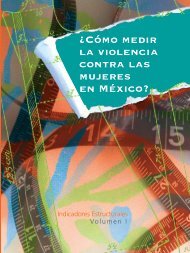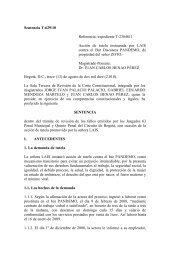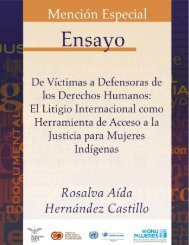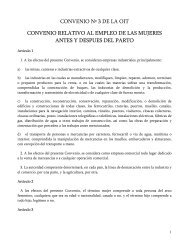cannot thereby be inferred that the intent of the drafters was not to punish unsuccessfulacts of incitement. In light of the overall travaux, the Chamber holds the view that thedrafters of the Convention simply decided not to specifically mention that such a <strong>for</strong>m ofincitement could be punished.562. There are under Common law so-called inchoate offences, which are punishable byvirtue of the criminal act alone, irrespective of the result thereof, which may or may nothave been achieved. The Civil law counterparts of inchoate offences are known as[infractions <strong>for</strong>melles] (acts constituting an offence per se irrespective of their results), asopposed to [infractions matérielles] (strict liability offences). Indeed, as is the case withinchoate offenses, in [infractions <strong>for</strong>melles], the method alone is punishable. Put anotherway, such offenses are "deemed to have been consummated regardless of the resultachieved [unofficial translation]"132 contrary to [infractions matérielles]. Indeed,<strong>Rwanda</strong>n lawmakers appear to characterize the acts defined under Article 91(4) of the<strong>Rwanda</strong>n Penal Code as so-called [infractions <strong>for</strong>melles], since provision is made <strong>for</strong>their punishment even where they proved unsuccessful. It should be noted, however, thatsuch offences are the exception, the rule being that in theory, an offence can only bepunished in relation to the result envisaged by the lawmakers. In the opinion of theChamber, the fact that such acts are in themselves particularly dangerous because of thehigh risk they carry <strong>for</strong> society, even if they fail to produce results, warrants that they bepunished as an exceptional measure. The Chamber holds that genocide clearly fallswithin the category of crimes so serious that direct and public incitement to commit sucha crime must be punished as such, even where such incitement failed to produce the resultexpected by the perpetrator.6.4. Crimes against Humanity (Article 3 of the Statute)Crimes against Humanity - Historical development563. Crimes against humanity were recognized in the Charter and Judgment of theNuremberg <strong>Tribunal</strong>, as well as in Law <strong>No</strong>. 10 of the Control Council <strong>for</strong> Germany.Article 6(c) of the Charter of Nuremberg <strong>Tribunal</strong> defines crimes against humanity as"..murder, extermination, enslavement, deportation, and other inhumane acts committedagainst any civilian population, be<strong>for</strong>e or during the war, or persecutions on political,racial or religious grounds in execution of or in connexion with any crime within thejurisdiction of the Chamber, whether or not in violation of the domestic law of thecountry where perpetrated."564. Article II of Law <strong>No</strong>. 10 of the Control Council Law defined crimes againsthumanity as:"Atrocities and Offenses, including but not limited to murder, extermination,enslavement, deportation, imprisonment, torture, rape, or other inhumane acts committedagainst any civilian population or persecution on political, racial or religious grounds,whether or not in violation of the domestic laws of the country where perpetrated."133565. Crimes against humanity are aimed at any civilian population and are prohibitedregardless of whether they are committed in an armed conflict, international or internal in
character134. In fact, the concept of crimes against humanity had been recognised longbe<strong>for</strong>e Nuremberg. On 28 May 1915, the Governments of France, Great Britain andRussia made a declaration regarding the massacres of the Armenian population inTurkey, denouncing them as "crimes against humanity and civilisation <strong>for</strong> which all themembers of the Turkish government will be held responsible together with its agentsimplicated in the massacres".135 The 1919 Report of the Commission on theResponsibility of the Authors of the War and on En<strong>for</strong>cement of Penalties <strong>for</strong>mulated byrepresentatives from several States and presented to the Paris Peace Conference alsoreferred to "offences against ... the laws of humanity".136566. These World War I notions derived, in part, from the Martens clause of the HagueConvention (IV) of 1907, which referred to "the usages established among civilisedpeoples, from the laws of humanity, and the dictates of the public conscience". In 1874,George Curtis called slavery a "crime against humanity". Other such phrases as "crimesagainst mankind" and "crimes against the human family" appear far earlier in humanhistory (see 12 N.Y.L. Sch. J. Hum. Rts 545 (1995)).567. The Chamber notes that, following the Nuremberg and Tokyo trials, the concept ofcrimes against humanity underwent a gradual evolution in the Eichmann, Barbie, Touvierand Papon cases.568. In the Eichmann case, the accused, Otto Adolf Eichmann, was charged withoffences under Nazi and Nazi Collaborators (punishment) Law, 5710/1950, <strong>for</strong> hisparticipation in the implementation of the plan know as the Final Solution of the Jewishproblem'. Pursuant to Section I (b) of the said law:"Crime against humanity means any of the following acts: murder, extermination,enslavement, starvation or deportation and other inhumane acts committed against anycivilian population , and persecution on national, racial, religious or politicalgrounds."137The district court in the Eichmann stated that crimes against humanity differs fromgenocide in that <strong>for</strong> the commission of genocide special intent is required. This specialintent is not required <strong>for</strong> crimes against humanity138. Eichmann was convicted by theDistrict court and sentenced to death. Eichmann appealed against his conviction and hisappeal was dismissed by the supreme court.569. In the Barbie case, the accused, Klaus Barbie, who was the head of the Gestapo inLyons from <strong>No</strong>vember 1942 to August 1944, during the wartime occupation of France,was convicted in 1987 of crimes against humanity <strong>for</strong> his role in the deportation andextermination of civilians. Barbie appealed in cassation, but the appeal was dismissed.For the purposes of the present Judgment, what is of interest is the definition of crimesagainst humanity employed by the Court. The French Court of Cassation, in a Judgmentrendered on 20 December 1985, stated:Crimes against humanity, within the meaning of Article 6(c) of the Charter of the<strong>International</strong> Military <strong>Tribunal</strong> annexed to the London Agreement of 8 August 1945,
- Page 2 and 3:
1.2. The Indictment1.3. Jurisdictio
- Page 4 and 5:
eports2 which indicated that acts o
- Page 6 and 7:
3. Jean Paul AKAYESU, born in 1953
- Page 8 and 9:
16. Jean Paul AKAYESU, on or about
- Page 10 and 11:
Counts 7-8(Crimes Against Humanity)
- Page 12 and 13:
c) Deliberately inflicting on the g
- Page 14 and 15:
1.4. The Trial1.4.1. Procedural Bac
- Page 16 and 17:
y the opening statement for the Def
- Page 18 and 19:
y the Tribunal for crimes related t
- Page 20 and 21:
38. Regarding the Gishyeshye meetin
- Page 22 and 23:
witness was lying because he or she
- Page 24 and 25:
in the commune. His de facto author
- Page 26 and 27:
70. Apart from asking the prefect t
- Page 28 and 29:
84. According to the testimony of D
- Page 30:
Scores of political leaders were im
- Page 33 and 34:
his listeners to avoid the error of
- Page 35 and 36:
111. The killing of Tutsi which hen
- Page 37 and 38:
killed on the grounds that the foet
- Page 39 and 40:
128. In conclusion, it should be st
- Page 41 and 42:
Witness statements137. During the t
- Page 43 and 44:
protection of witnesses issued by t
- Page 45 and 46:
covered anyone who had anti-Tutsi t
- Page 47 and 48:
Tutsi and the Tutsi were accused of
- Page 49 and 50:
as "two armies", "two belligerents"
- Page 51 and 52:
"The primary criterion for [definin
- Page 53 and 54:
180. Many witnesses testified regar
- Page 55 and 56:
stated in that Decision, it did not
- Page 57 and 58:
deeds. For these reasons, the Chamb
- Page 59 and 60:
Concerning the allegation that at l
- Page 61 and 62:
turned over alive to Akayesu, and t
- Page 63 and 64:
younger brothers. He stated that he
- Page 65 and 66:
237. Karangwa testified under cross
- Page 67 and 68:
three brothers lie on their stomach
- Page 69 and 70:
known as Usuri (phonetic spelling)
- Page 71 and 72:
Karangwa's explanation for the inco
- Page 73 and 74:
Count 3, Crimes against Humanity (e
- Page 75 and 76:
those killed were professors from R
- Page 77 and 78:
290. Witness DCC for the Defence, d
- Page 79 and 80:
children, and old people. The Chamb
- Page 81 and 82:
further that he had not heard of Ak
- Page 83 and 84:
to fetch the one who remains', a pr
- Page 85 and 86:
sector councillors called on the cr
- Page 87 and 88:
According to witness A, the bourgme
- Page 89 and 90:
present took it to mean that the Tu
- Page 91 and 92: 355. The Accused himself confirmed
- Page 93 and 94: 364. Paragraph 15 of the Indictment
- Page 95 and 96: The witness said a certain Françoi
- Page 97 and 98: has not been proved beyond reasonab
- Page 99 and 100: who had come to his house. He said
- Page 101 and 102: Interahamwe at the entrance, carryi
- Page 103 and 104: ack to the bureau communal and on t
- Page 105 and 106: Victim Y (Witness N), a [68] year o
- Page 107 and 108: which were at times committed by mo
- Page 109 and 110: communal into a forest in the area
- Page 111 and 112: clubbing a young teacher who had be
- Page 113 and 114: 434. Two days after arriving at the
- Page 115 and 116: he went into hiding during the mass
- Page 117 and 118: ureau communal, but he insisted tha
- Page 119 and 120: taken away from the bureau communal
- Page 121 and 122: The Accused himself testified that
- Page 123 and 124: 464. In that case, when the matter
- Page 125 and 126: "A person who planned, instigated,
- Page 127 and 128: involve facilitating the commission
- Page 129 and 130: 493. In accordance with the said pr
- Page 131 and 132: Deliberately inflicting on the grou
- Page 133 and 134: y a psychological relationship betw
- Page 135 and 136: Chamber notes that, as stated above
- Page 137 and 138: • complicity by procuring means,
- Page 139 and 140: 547. Consequently, where a person i
- Page 141: underscoring their commitment to se
- Page 145 and 146: 575. The definition of crimes again
- Page 147 and 148: grounds mentioned in Article 3 of t
- Page 149 and 150: accepted definition of this term in
- Page 151 and 152: adopted primarily to protect the vi
- Page 153 and 154: 610. Whilst the Chamber is very muc
- Page 155 and 156: description, namely, what constitut
- Page 157 and 158: forces to plan and carry out concer
- Page 159 and 160: 635. There is no clear provision on
- Page 161 and 162: 7.2. Count 5 - Crimes against human
- Page 163 and 164: 663. The definition of crimes again
- Page 165 and 166: 677. The Tribunal notes that eviden
- Page 167 and 168: 685. In the light of its factual fi
- Page 169 and 170: 692. The Tribunal finds, under Arti
- Page 171 and 172: determine, as far as each proven fa
- Page 173 and 174: the Tutsi in general. Akayesu who h
- Page 175 and 176: 722. As regards the allegations in
- Page 177 and 178: 732. The rape of Tutsi women was sy
- Page 179 and 180: Chamber finds beyond a reasonable d
- Page 181 and 182: Footnote 11. Decision: Order for Co
- Page 183 and 184: Footnote 41. Article 104 of the Loi
- Page 185 and 186: Footnote 68. Dictionnaire Rwandais-
- Page 187 and 188: Footnote 103. "Principles of Intern
- Page 189 and 190: Footnote 134. Secretary General's R
- Page 191: Footnote 171. See General Legal Fin


